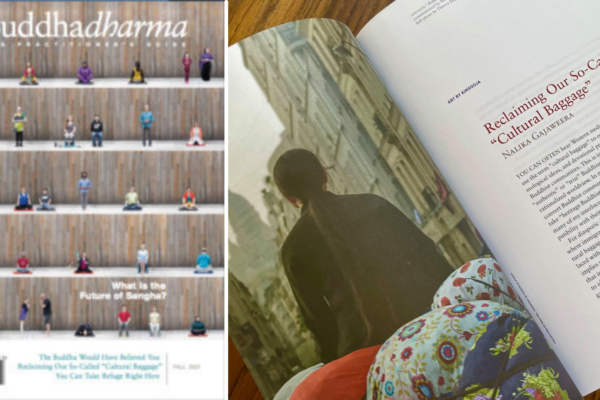This article was originally published by Buddhadharma: The Practitioner’s Quarterly.
You can often hear Western meditation-based convert circles use the term “cultural baggage” to refer to the ritualized acts, cosmological ideas, and devotional practices associated with “heritage” Buddhist communities. This is in contrast to the idea of a more “authentic” or “true” Buddhism that is consonant with a modern rationalized worldview. In my research among meditation-centric convert Buddhist communities, I consistently observe a reluctance to take “heritage Buddhist” practices and cosmologies seriously, with many of my interlocutors often commenting on these ideas’ incompatibility with their own interpretation of Buddhism.
For diasporic Asian Buddhists like myself in the United States, where immigrants are expected to assimilate and to “leave their cultural baggage at the door,” the term “cultural baggage” is of course laced with a pejorative sentiment. After all, the “baggage” imagery implies something one carries at all times, a burdensome hindrance that interferes in one’s freedom of movement. If to be American is to idealize freedom and hyper-individualism, having cultural baggage suggests a sense of being weighted and burdened, being held down by one’s inheritance and the cultural specificities of ancestral heritages. Indeed, in the context of Anglophone understandings of Buddhism in the United States, where claims over what is “authentic Buddhism” depend upon disentangling and freeing the “true” teachings of the dharma from its perceived “religious” or “traditional” features, the weight of cultural baggage for Asian diaspora Buddhists can be uncomfortable, to say the least.
For some of us, especially second-generation Asian American Buddhists, this weight of cultural baggage has meant a tenuous struggle around distancing ourselves from the devotional practices of ritual and worship. For others, it has involved a disaffiliation from religious institutions such as temples, churches, and dojos, or it has manifested as a strong aversion to the social and political imbrications of Buddhism. For myself, as a Sinhalese Buddhist Sri Lankan American, this has sometimes entailed a strong desire to distance myself from certain aspects of Buddhism, such as the ethno-religious Buddhist nationalism that has had violent implications for minorities in Sri Lanka. This option—to abstract some form of romanticized “pure dharma” from any relationship to lived tradition and culture, to free Buddhism from its ongoing and historical transformation—can sometimes seem to hold the promise of freeing us from our liability as active subjects in the making of Buddhism.
I propose a disruption of the taken-for-granted normative understanding of cultural baggage. I suggest we, as Asian American Buddhists, reimagine the notion of cultural baggage in a way that centers our needs and concerns in relation to our communities and the broader society we are embedded in; I suggest we claim this weighty baggage as a mark of our responsibility to our community, of our belonging, and of our accountability to what others in our communities are doing.
As Asian diasporic and Asian American Buddhists, what is our responsibility? There is, of course, our responsibility to our temples and churches as institutions. But there is also the need to recognize the contributions and role that such institutions play in serving our communities; in doing so, we can resist certain moves within the mainstream to erase the contributions of Asian and Asian American Buddhists in the development of Buddhism in the US. At the same time, it is important that we pay careful attention and scrutiny to how our communities and sanghas cause harm and violence toward vulnerable others, here and elsewhere.
Simply put, to claim one’s baggage is to take refuge in the sangha. But it is also to understand that, at times, it is necessary to disrupt our sanghas, to interrupt the ways in which our communities can actively and passively contribute to systemic forms of violence.
Click here to read the full piece on lionsroar.com.
Photo Credit: Creative Commons by Roger Wagner / Flickr
Nalika Gajaweera was a senior research analyst with the USC Center for Religion and Civic Culture through 2023.







